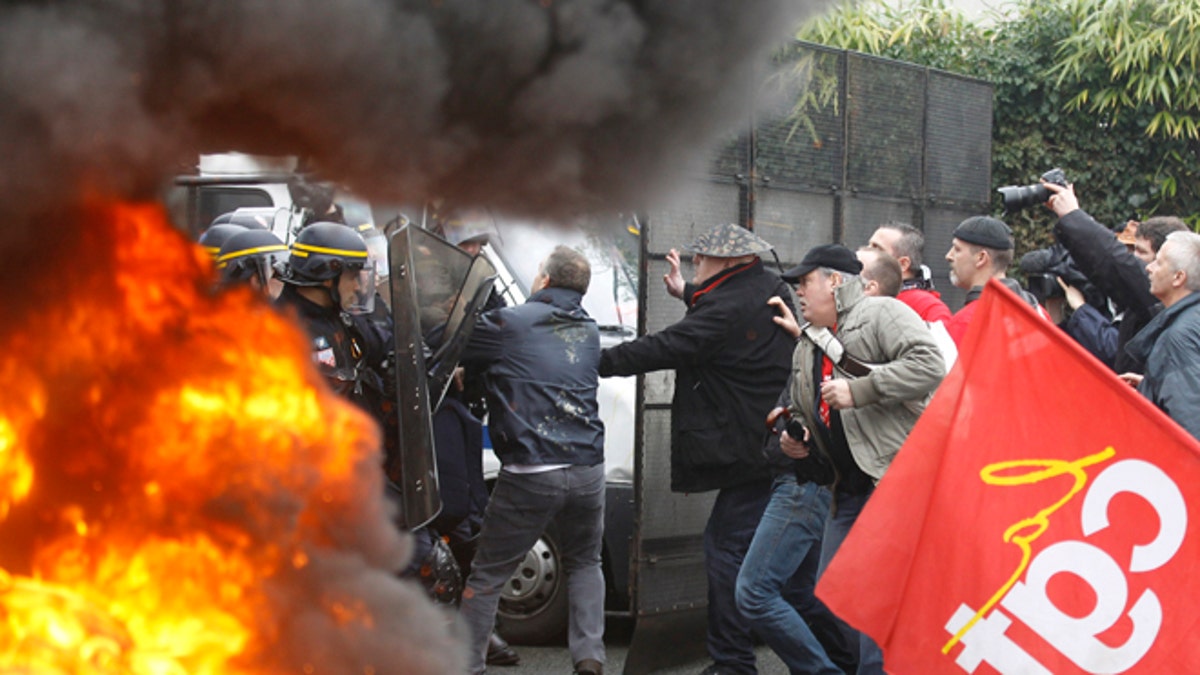
March 7, 2013: Goodyear employees scuffle with riot policemen during a demonstration against layoffs, in front of Goodyear headquarters in Rueil Malmaison, west of Paris. (AP)
RUEIL-MALMAISON, France – Burning the very fruit of their labor, workers from Goodyear clashed with police outside the tire-maker's French headquarters Thursday in a last-ditch attempt to save their jobs.
Goodyear has been trying to restructure or close its plant in northern France for five years, saying it's too expensive to make tires there in the face of a shrinking European market. It wants to move production to China, where the tires can be made more cheaply and will be closer to booming markets.
Workers' protests, government concerns and the Byzantine layoff process in France have held up the factory closure. In yet another effort to save the plant and its 1,200 jobs, hundreds of Goodyear employees protested Thursday outside the company's offices near Paris, setting fire to a pile of tires in protest. Inside, union representatives met with management.
Protesters fired paintballs at a line of riot police sheltering behind their shields. There were several brief clashes, as police drove large barriers forward in an effort to push back the protest. One demonstrator tore away a policeman's shield while others set upon the officer, hitting him on the head. Only a spray of tear gas pushed them back.
Police did not immediately respond to requests for an injury toll.
The fight over the Goodyear factory has become a symbol of France's hidebound labor market, which drew the derision of an outspoken American executive whose company considered taking the plant over.
"The French workforce gets paid high wages but works only three hours. They get one hour for breaks and lunch, talk for three and work for three," Maurice Taylor, the CEO of Titan tires, wrote to a French government official.
France's political leaders took umbrage at the letter, but the country's Socialist government is also trying to reform labor regulations, saying that relaxing rules on firing is key to also improving hiring.
France's unemployment has been intractably high for years, even during boom times, and it has skyrocketed in recent months as Europe's economic crisis has deepened. Statistics released Thursday showed the jobless rate rose to 10.6 percent last year.
Labor rules and generous benefits also make it expensive to produce in France, leaving the country with a major competitiveness problem that the global economic slowdown has exposed and exacerbated. Many companies that produce in France are now in a bind: Either they get beaten by competitors with more room to slash prices because they have lower costs or they also cut prices to compete, leaving little left over to reinvest in the kind of innovation that insulates manufacturers from such price competition.
The government's proposed reform — unveiled Wednesday — would offer companies in financial difficulty more flexibility in setting working hours and salaries. The government hopes that will help businesses stay afloat, instead of shutting down factories or moving production to countries with cheaper labor.
It's unclear if that reform would help a company like Goodyear, which is still profitable, even in Europe. Workers, in fact, have seized on the company's profitability in their fight against the factory closure, but the company says profit margins have been slipping for years and that the business in Europe isn't sustainable.
"We came here to fight and avoid that they close down our factory because there is no reason for the factory to close down because it is extremely profitable," said Richard Jouhannet, a worker from the doomed factory in Amiens, who was outside Goodyear's headquarters on Thursday. "We are fighting in the courts and today we are in the streets."
Goodyear made $183 million last year, down more than 40 percent from the year earlier.
___
DiLorenzo reported from Paris.
___
Sarah DiLorenzo can be followed at http://witter.com/sdilorenzo
